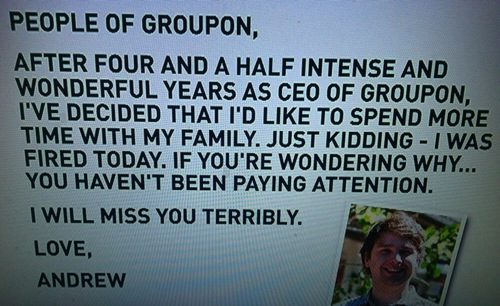I’ve never liked Groupon. Rightly or wrongly, I’ve always thought that the company, and it’s well-known “daily deals,” were bad for small businesses. My sense, and I’ve had it verified by a few business owners, is that they gravitate toward Groupon when they’re desperate, offering deep, unsustainable discounts to Groupon users, who, for the most part, aren’t interested in building long-term relationships with said businesses. Business owners, during slow sales periods, however, are lured by the prospect of getting large numbers of people through their doors, which they hope will make up for the fact that they’re entering into a relationship with a company that demands the lion’s share of the profits garnered in the pre-selling of their goods and services. Invariably, the business owner is overwhelmed by the subsequent uptick in business, provides less than superior customer service, and barely makes it through the ordeal intact. (I’ve heard more than once that the only thing that makes the Groupon model viable is that some percentage of people who buy the coupons never redeem them, allowing the company to keep their cut without providing the good or service.) So, for all of those reasons, it’s never seemed like a tenable model to me, and, given Groupon’s dismal earnings of late, I suspect that others have come to the same conclusion. It might be too early to count the company out completely, as cash-strapped American consumers are always anxiously looking for bargains, and struggling companies will always be susceptible to the pimp-like patter of Groupon sales reps, but it would seem that bodies are finally starting to hit the floor. The following message was sent out yesterday by Groupon CEO Andrew Mason, who has apparently been able to maintain his sense of humor over all of this.













16 Comments
The easiest way to know if a local business is failing — are they offering a Groupon?
Has anyone done an academic study looking at what happens to companies that attempt Groupon? I’m curious as to how many are still in business a year afterward.
Never liked Groupon or the daily deals model after looking into it. But man about a year and a half ago there was intense intense demand for us at the co-op to do something with daily deals. Like I was being the biggest dumbass of all Time to miss the opportunity to participate on Groupon or something like it. I just couldn’t ever see the economic benefit long-term from the system. Rosie bought a few for herself and we just felt bad using them when we found out what it was like.
Are there any people in the audience who know of Groupon success stories? Are there businesses that were able to translate Groupon campaigns into real, sustained growth? I’ve tried Groupon a few times and I’ve never gone back to those businesses afterward. I suspect most people are the same. If any businesses have figured it out though I’d like to hear about it. How do you turn Gruponers into customers?
I’ve only used it a few times. Once was when Roos Roast had a special (I forget what it was). I love that place and I am a loyal customer. When I realized what a shitty business model this is, I felt horrible.
Like Edward, I would love to hear “success stories”!
Count me as one who ‘hasn’t been paying attention,’ so maybe this is a dumb question, but… I don’t get it. I’ve heard stories about Yelp terrorizing businesses (more awful reviews magically appear when someone doesn’t buy advertising, salesperson says “I can help you with that” if you buy…), but did Groupon get a reputation for coercing businesses into their deals? After the first week or two of Groupon’s existence, any business owner who claimed they didn’t know there’d be a chance of an overwhelming response just doesn’t seem like a very good business owner.
I skimmed the NYT article and didn’t see much that wouldn’t be unexpected to me (a schmuck who’s never owned a business or taken an accounting class). Waaah, not everyone who came with a coupon remained loyal. Waaah, I earned less than I would if I had offered this deal without the huge marketing power of this service. Waaah, I offered a deal that was so good many people bought it, and then they actually came to my establishment.
I’m honestly not trying to troll here, and I don’t work for any daily deal site in any way. I just don’t get it. If the individual deal costs the business owner money, surely they considered it an advertising expense. If the deals are so good that many customers are unlikely to be able to afford your normal prices or consider them worth your product, many probably won’t remain loyal. If you don’t know what the internet is and have never heard of Groupon, don’t sign a contract until you figure it out. I’m generally a ‘fuck big business’ kind of guy, but I guess there’s some component here that I’m missing and which is important to the story of blame. The only one I can imagine making sense is coercion of some kind on the part of Groupon, otherwise… perhaps in the natural selection of businesses, those owned by people unable to see the big picture/prepare for things not to always go perfectly are likely to die off one way if not another?
Mr. Farts, I wasn’t saying that Groupon was lying to the businesses that they work with. I wasn’t suggesting any manipulation. I was just saying that Groupon, to a large extent, preys on the vulnerable. I forget what the split is, but I’ve been told by business owners that, if not for the fact that 15% or so of purchased Groupon deals were never redeemed, they’d lose money. As it is, though, it’s constructed in such a way that they barely break even. I’m not saying that it doesn’t serve a purpose. I can see how it might, under the right circumstances, be leveraged to save a business and buy some time. But, for the most part, I think it just delays the inevitable. Huge numbers of people flock to a business, pick at the bones, and leave, never to return. I’m sure there are exceptions, but that’s been my experience.
I have never used groupon but do use dealsavers, mostly for restaurants at a location in the south that I often frequent. I always figured that if a business was willing to offer what usually amounts to a 50% (get thirty bucks worth of food for fifteen) discount, then – cool. I found some places I liked and have returned to and others where I would not go back to. No one forces a business to offer up their product or service at a heavy discount. I don’t think that a business enters into an agreement blindly.
As a business model, I actually laughed to myself in the car when I heard a story of an IPO for this company. A business model based on coupons – not gonna work in the long term
My understanding is that it works for businesses with very low per unit costs or well defined slow periods. Yoga studios where adding 5 people to a class at half price doesn’t cost anything and might get newbies hooked, or skydiving companies where getting another jump in on a Tuesday gets the most out of high capital costs. Low margin businesses with limited capacity like restaurants seem like a horrible use of groupons.
I suspect you’re right, Josh. It hadn’t occurred to me, but your yoga class example makes perfect sense. There is a down side, though. I wonder what the people in the class who are playing the full price think when they discover that others are paying half. Will they be less inclined to keep paying at the same level? And will any significant percentage of Grouponers convert to full-price customers? I’m sure that there’s research. I just haven’t seen it. But, yes, it does make sense that a skydiving business, for instance, could use it to get new people in the door. They wouldn’t lose anything by throwing a few more people out of the plane, as they already have to pay for fuel and staff, and there’s a good chance that some of them could get hooked and come back for more.
That’s what pricing is like on a plane or a train or a cruise. Even for a sporting venue. Variable according to demand at the time of purchase.
They should sell Groupin stock on Groupon!
hunh. Can’t escape the ringing of “buyer beware” on all sides:
– Merchants giving deals that they might not be able to make money at (i.e. gotta read the fine print)
– Coupon buyers not redeeming their coupons (don’t buy something you’re not going to use)
– 32-year-old CEO of a startup that well-nigh-instantaneously IPO’s it’s way a multi-billion company, then butthurt-ly tweets about being shown the door for a 80% loss of market value. (IPO = cashing out. Once you sell the company (IPO also = selling the company), you no longer have control) I’m sure he’ll cry his way home in his Ferrari.
from http://bits.blogs.nytimes.com/2011/01/10/groupon-raises-a-record-950-million-in-venture-capital/ :
“Groupon, which is just over two years old and based in Chicago, has quickly catapulted into the ranks of the top tech companies.” That’s the other thing about catapaults… the projectile goes up, and then back down.
… and let’s not forget the death spiral of Zynga, which is turning to online gambling (?!) as a life preserver.
Easy come, easy go. The only people that probably made money were the VC/early investors, and that seems to be the domain of “right place/right time”. So someone please remind me how the stock market is about “investment” and different from straight-up high-stakes gambling?
We did a groupon at RoosRoast- we basically succumbed to a guy named Jonathan’s relentless pressure to do it. Because we were not eager, he gave us a deal on the terms. We were also very careful about what we offered so that financially, we could justify it as if we were buying an ad but for trade instead. A lot of businesses crash and burn because they offer more than their business can handle or they don’t really do the math on it. (?) We were also super friendly to our groupon customers, encouraging them to come in and not feel shy. We showered them with kindness. Over all, I think we did get a lot of new customers from it and some new visibility, but it was a lot of work!
Now there’s so many copycats, not sure how they can sustain it. I will say, they do have great writers there- and we liked that. Looks like Andrew Mason set the tone for the writing.
Some coupons are better than others.
http://markmaynard.com/wp-content/uploads/2013/03/SidetrackMarchDeal.jpg
i just saw that coupon for the sidetrack. are they going out of business?